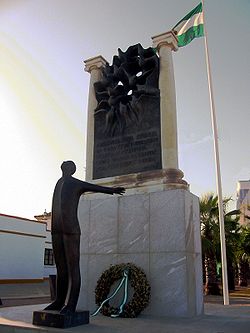
Blas Infante
Encyclopedia


Casares, Málaga
Casares is a town and municipality in Spain, located in Málaga province, in the autonomous community of Andalusia.-Geography and demography:...
, Spain
Spain
Spain , officially the Kingdom of Spain languages]] under the European Charter for Regional or Minority Languages. In each of these, Spain's official name is as follows:;;;;;;), is a country and member state of the European Union located in southwestern Europe on the Iberian Peninsula...
; 5 July 1885 - Seville
Seville
Seville is the artistic, historic, cultural, and financial capital of southern Spain. It is the capital of the autonomous community of Andalusia and of the province of Seville. It is situated on the plain of the River Guadalquivir, with an average elevation of above sea level...
, Spain
Spain
Spain , officially the Kingdom of Spain languages]] under the European Charter for Regional or Minority Languages. In each of these, Spain's official name is as follows:;;;;;;), is a country and member state of the European Union located in southwestern Europe on the Iberian Peninsula...
; 11 August 1936). Blas Infante was an andalusist politician, writer, historian and musicologist, known as the "Father" of Andalusian fatherland
Andalusian nationalism
Andalusian nationalism or Andalusian regionalism, sometimes referred as Andalucismo in Spanish, is the name given to the political movement in Spain advocating the recognition of Andalusian people as a "nation". It is considered to be represented primarily by the Andalusian Party but there are also...
(Padre de la Patria Andaluza).
Infante was a Georgist idealist who initiated an assembly at Ronda
Ronda
Ronda is a city in Spanish province of Málaga. It is located about West from the city of Málaga, within the autonomous community of Andalusia. Its population is approximately 35,000 inhabitants.-History:...
in 1918. This assembly adopted a charter
Charter
A charter is the grant of authority or rights, stating that the granter formally recognizes the prerogative of the recipient to exercise the rights specified...
based on the autonomist Constitución Federal de Antequera written in 1883 during the First Spanish Republic
First Spanish Republic
The First Spanish Republic was the political regime that existed in Spain between the parliamentary proclamation on 11 February 1873 and 29 December 1874 when General Arsenio Martínez-Campos's pronunciamento marked the beginning of the Bourbon Restoration in Spain...
. It also embraced the current flag
Flag of Andalusia
The current flag of Andalusia was adopted in 1918. Blas Infante , the "Father" of the Andalusian Fatherland , initiated an assembly at Ronda in 1918...
and coat of arms
Coat of arms of Andalusia
The coat of arms of Andalusia is the official symbol of Andalusia, an autonomous community of Spain. It bears the Pillars of Hercules, the ancient name given to the promontories that flank the entrance to the Strait of Gibraltar.-Origin:...
as "national symbols", designed by Infante himself based on various historic Andalusian
Al-Andalus
Al-Andalus was the Arabic name given to a nation and territorial region also commonly referred to as Moorish Iberia. The name describes parts of the Iberian Peninsula and Septimania governed by Muslims , at various times in the period between 711 and 1492, although the territorial boundaries...
standards. During the Second Spanish Republic
Second Spanish Republic
The Second Spanish Republic was the government of Spain between April 14 1931, and its destruction by a military rebellion, led by General Francisco Franco....
, the Andalucismo was represented by the Junta Liberalista, a federalist political party led by Infante.
Infante was among numerous political figures who were summarily executed by Franco
Francisco Franco
Francisco Franco y Bahamonde was a Spanish general, dictator and head of state of Spain from October 1936 , and de facto regent of the nominally restored Kingdom of Spain from 1947 until his death in November, 1975...
's forces when they took over Seville at the beginning of the Spanish Civil War
Spanish Civil War
The Spanish Civil WarAlso known as The Crusade among Nationalists, the Fourth Carlist War among Carlists, and The Rebellion or Uprising among Republicans. was a major conflict fought in Spain from 17 July 1936 to 1 April 1939...
. As both a regional autonomist and a kind of libertarian socialist, he twice "merited" inclusion on their liquidation list.
His last residence in Coria del Río
Coria del Río
Coria del Río is a small town near Seville, on the shores of Guadalquivir river.It is popularly known because there are some descendants of the first-ever Japanese official envoy to Spain. In early 17th century, Daimyo Date Masamune of Sendai sent a delegation led by Hasekura Tsunenaga to Europe....
now hosts the Museum of Andalusian Autonomy.
Published works
- La Obra de Costa (1916)
- La Sociedad de Naciones (with J. Andrés Vázquez, 1917)
- Motamid, último rey de Sevilla (1920)
- Cuentos de Animales (1921)
- Los Mandamientos de Dios a favor de los animales (1921)
- La Dictadura pedagógica (1921)
- Reelección Fundamental - Primer Volumen - La Religión y la Moral (1921)
- Orígenes de lo flamenco y secreto del cante jondo (1929–31)
- La verdad sobre el complot de Tablada y el Estado libre de Andalucía (1931)
- Cartas Andalucistas de Septiembre de 1935 (1935)
- Manifiesto a todos los andaluces (1936)
Unpublished works
- Fundamentos de Andalucía - 1ª serie de Cartas Andalucistas (unpublished, 1929)
- El Libro Nuevo (unpublished)
- Almanzor (unpublished)

